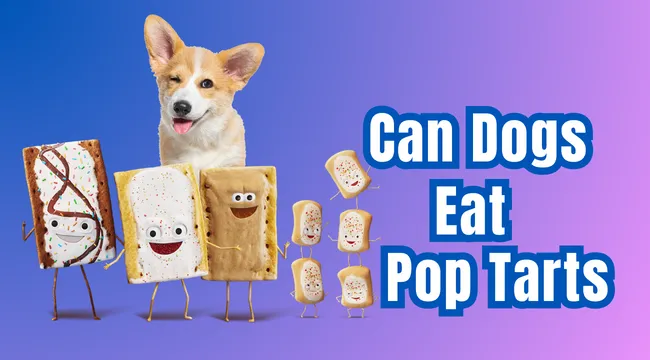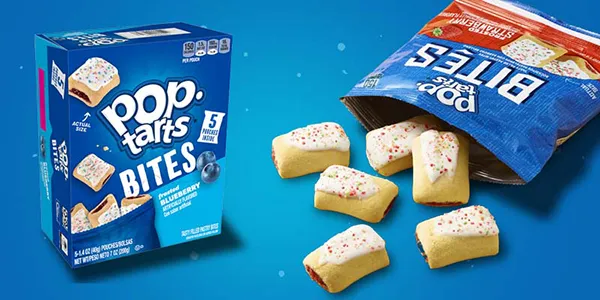
If you’ve ever found yourself enjoying the sugary delight of Pop Tarts, you might wonder if your furry friend can partake in this sweet treat too. Kids especially love these sugary pastries, but when it comes to sharing with your pup, caution is key. We’re all aware that Pop Tarts aren’t exactly nutritional powerhouses, and the general rule is that many human foods aren’t suitable for dogs. In this exploration of Pop Tarts and canine companionship, we’ll delve into whether your dog can savor a small piece without encountering any issues. Let’s uncover the surprising answer as we navigate the world of snacks and pets in a paw-friendly way.
What is Pop Tarts?

Pop-Tarts are tasty toaster pastries created by Kellanova back in 1964. Imagine a delicious combo of sweet fillings snugly sealed between two layers of thin, rectangular pastry crust – it’s like a flavor-packed pocket! And guess what? Most of them even have a sugary frosting on top. While you can buy them pre-cooked, the real magic happens when you warm them up in a toaster or microwave. So, if you’re looking for a quick and yummy breakfast or snack, Pop-Tarts are the way to go!
Can Dogs Eat Pop Tarts?
Nope, giving your dog Pop Tarts is a big no-no. Even if you’re tempted to share a little nibble, it’s not a good idea. These toaster pastries might not cause an immediate problem, but they pack a punch of unhealthy stuff for your furry friend. Pop Tarts are loaded with sugars, wheat flour, artificial flavors, and coloring agents – all things that can stir up allergies or health troubles in your pet. So, it’s safest to keep these sweet treats far away from your dog’s reach and stick to dog-friendly snacks instead!
Are They Toxic To Dogs?
While Pop Tarts may not be immediately toxic to dogs, they are not safe for them. The ingredients, including sugars, wheat flour, artificial flavors, and coloring agents, can be harmful and lead to health issues. It’s best to avoid giving Pop Tarts to dogs and opt for treats designed specifically for their consumption. It’s important to note that Pop Tarts come in various flavors, and some, such as Frosted Chocolate Chip Pop-Tarts and Frosted Chocolate Fudge Pop-Tarts, can pose a risk to dogs due to the inclusion of chocolate. Chocolate is known to be toxic to dogs, causing symptoms from mild discomfort to severe health issues, including toxicity. To ensure the safety and well-being of your dog, it’s crucial to keep all varieties of Pop Tarts away from them. If accidental ingestion occurs, promptly contact your veterinarian for advice.
Potential Harmful Ingredients in Pop-Tarts for Dogs
While many of the ingredients in Pop-Tarts are safe for humans, some can be harmful to dogs if ingested. It’s essential to note that dogs have different dietary requirements and sensitivities than humans. Here are a few ingredients in Pop-Tarts that may be unhealthy for dogs:
- High Fructose Corn Syrup: High sugar content can lead to obesity and dental issues in dogs. Moreover, some dogs may be sensitive to corn products.
- Artificial Colorings (Yellow #6, Red #40): Some dogs may be sensitive to artificial colors, and these additives have been associated with allergic reactions in pets.
- Sugar: Excessive sugar consumption can contribute to obesity and dental problems in dogs, similar to humans.
- Artificial Flavorings: While specific details about the artificial flavorings are not disclosed, some dogs may have sensitivities or allergies to certain artificial additives.
- TBHQ (Tertiary Butylhydroquinone): This synthetic antioxidant is used to preserve freshness. While it’s generally regarded as safe in small amounts for humans, it’s best to avoid giving it to dogs in any quantity.
- Salt: While a small amount of salt is essential for dogs, excessive salt intake can lead to sodium ion poisoning, causing symptoms like vomiting, diarrhea, tremors, and seizures.
It’s important to remember that dogs have different nutritional needs, and human food, especially processed snacks like Pop-Tarts, is not designed for their consumption. Feeding dogs a balanced diet of dog food specifically formulated for their needs is crucial for their health. If your dog accidentally consumes any food meant for humans, especially those containing potentially harmful ingredients, it’s recommended to contact your veterinarian for guidance.
Types of Pop Tarts
Here is a list of Pop-Tarts flavors mentioned in the provided text:
- Frosted Apple Cinnamon Apple Jacks® Pop-Tarts®
- Frosted Banana Bread Pop-Tarts®
- Frosted Chocolatey Chip Pancake Pop-Tarts®
- Frosted Cinnamon Roll Pop-Tarts® Bites
- Frosted Strawberry Milkshake Pop-Tarts®
- Frosted Sugar Cookie Printed Fun Pop-Tarts®
- Eggo® Frosted Maple Flavor Pop-Tarts®
- Frosted Blueberry Pop-Tarts®
- Frosted Brown Sugar Cinnamon Pop-Tarts®
- Frosted Cherry Pop-Tarts®
- Frosted Chocolate Chip Pop-Tarts®
- Frosted Chocolate Fudge Pop-Tarts®
- Frosted Confetti Cupcake Pop-Tarts®
- Frosted Cookies & Crème Pop-Tarts®
- Frosted Grape Pop-Tarts®
- Frosted Hot Fudge Sundae Pop-Tarts®
- Frosted Raspberry Pop-Tarts®
- Frosted S’Mores Pop-Tarts®
- Frosted Strawberry Pop-Tarts®
- Frosted Wildlicious Wild Berry Pop-Tarts®
- Simply Frosted Harvest Strawberry Pop-Tarts®
- Snickerdoodle Pop-Tarts®
- Unfrosted Blueberry Pop-Tarts®
- Unfrosted Brown Sugar Cinnamon Pop-Tarts®
- Unfrosted Strawberry Pop-Tarts®
- Brown Sugar Cinnamon Pop-Tarts® Bites
- Frosted Blueberry Pop-Tarts® Bites
- Frosted Chocolatey Fudge Pop-Tarts® Bites
- Frosted Cinnamon Roll Pop-Tarts® Bites
- Frosted Confetti Cake Pop-Tarts® Bites
- Strawberry Banana Pop-Tarts® Bites
- Strawberry Pop-Tarts® Bites
What to Do if a Dog Eats Pop-Tarts: Recognizing Symptoms and Seeking Veterinary Care
If a dog has ingested Pop-Tarts or any food not intended for them, it’s important to monitor them closely and take appropriate action. Here’s what you should do if your dog eats Pop-Tarts:
- Check the Ingredients: Examine the ingredients list on the Pop-Tart packaging to identify any potentially harmful substances, such as chocolate, xylitol, or other toxic ingredients.
- Observe for Symptoms: Watch for any unusual symptoms or behaviors in your dog. Symptoms may vary depending on the specific ingredients consumed but could include:
- Contact the Veterinarian: If you suspect your dog has consumed a harmful substance, contact your veterinarian immediately. Provide them with information on the ingredients and any observed symptoms.
- Do Not Induce Vomiting Without Professional Guidance: It’s crucial to consult with your veterinarian before attempting to induce vomiting. Some substances, like caustic or corrosive materials, can cause more harm when brought back up.
- Bring Packaging: If possible, bring the packaging of the consumed item with you to the veterinarian. This can help the vet identify specific ingredients and take appropriate action.
- Follow Veterinarian’s Advice: Follow the advice given by your veterinarian. They may recommend bringing your dog in for an examination, administering certain medications, or other appropriate measures based on the situation.
Remember, early intervention is key, and seeking professional veterinary advice is the best course of action. Do not wait to see if symptoms worsen, as some toxicities can be time-sensitive. Always keep human food, especially items containing potentially harmful ingredients, out of reach of your pets to prevent accidental ingestion.
Conclusion
In conclusion, it is not advisable to feed Pop-Tarts to dogs. While some flavors may not contain immediately toxic ingredients, the overall composition of Pop-Tarts, including high sugar content, artificial additives, and potential inclusion of harmful substances like chocolate or xylitol, makes them unsuitable for canine consumption. Dogs have different nutritional needs and sensitivities compared to humans, and feeding them inappropriate foods can lead to various health issues. If a dog accidentally ingests Pop-Tarts or any human food, it’s crucial to monitor for symptoms, contact a veterinarian promptly, and follow professional advice to ensure the well-being of our furry companions. The best practice is to provide dogs with a balanced diet tailored to their specific dietary requirements and to avoid sharing human snacks that may pose a risk to their health.
Read more:
- Can Dogs Eat Cumin?
- Can Dogs Eat Banana Peels?
- Can Dogs Eat Octopus?
- Can Dogs Eat Oatmeal Cream Pies?
- Can Dogs Have Provolone Cheese?
- Can Dogs Eat Egg Rolls?
- Can Dogs Eat Tamales?
- Can Dogs Eat Yellow Rice?
- Can Dogs Eat Babybel Cheese?
- Can Dogs Eat Plantain Chips Safely?
- Can Dogs Eat French Toast?
- Can Dogs Eat Veggie straws?
- Can Dogs Eat Rotisserie Chicken?
- Can Dogs Eat Orange Chicken?
- Can Dogs Eat Durian Safely?
- Can Dogs Eat Cheerios?
- Can Dogs Eat Couscous?
- Can Dogs Eat Funyuns?
- Can Dogs Eat Acai?
- Can Dogs Eat Tuna?
- Can Your Dog Eat Onions?
- Can my dog eat this?



